#passion week
Text
palm sunday yes, but also...
"table-flippin'-temple-cleansin' sunday" and "fig tree cursing sunday" are also acceptable
#i just wanted to point out that these things happened during holy week RIGHT AFTER PALM SUNDAY#possibly even on the same day#holy week#passion week#Christianity#easter#resurrection sunday#Jesus
160 notes
·
View notes
Text
When Jesus prayed for the cup to pass before him, I imagine Palm Sunday was echoing in his ears. The cries of "Hosanna-- deliver us!" And the faces of the sick he healed in the temple before driving out the money lenders must surely have been on his mind, with the devotion and bewilderment of his friends as he knelt to wash their feet. He Loved them til the end. He Loved them to the end. LOVE brought him out of the garden and to the cross.
24 notes
·
View notes
Text
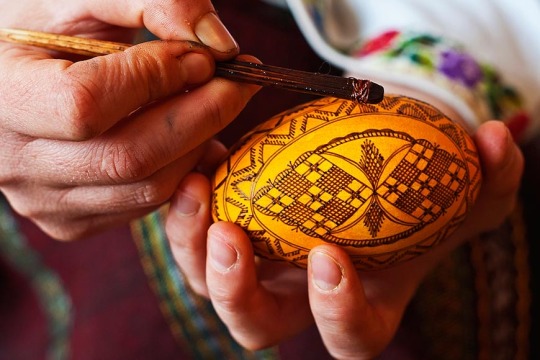
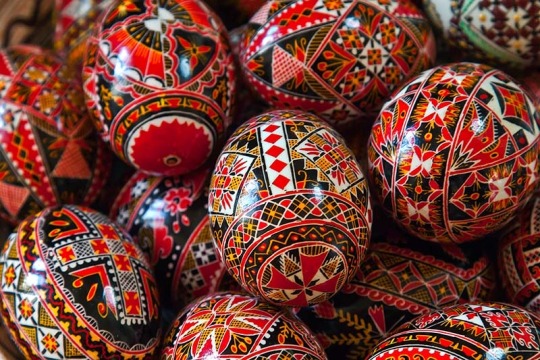
Egg dyeing is one of the most important Romanian Easter traditions, performed on Thursday of Holy Week. The painted eggs are always present on the table during the holiday, and kids can hardly wait to participate in the egg tapping competitions. The traditions say that people who knock painted eggs on the first day of Easter will see each other after death.
Although the ornamental details vary from one region to another, all of the elements on the decorated eggs have meaning. Here's the interpretation for some of them:
- the vertical line means life
- the horizontal line means death
- the double line means eternity
- the line with rectangular symbols means knowledge
- the curved line means water
- the spiral means time, eternity
- the double spiral means the bond between life and death.
#romania#rural romania#traditionalism#tradition#traditional folk#folk art#folk aesthetic#folk culture#easter eggs#easter#holy week#passion week#eastern europe#europe#symbols#motifs#colors#life#death#eternity#water#bond
135 notes
·
View notes
Text
Jesus’ Last Week: Thursday, April 2, A.D. 33
HOLY THURSDAY IS THE day on which Jesus celebrated the Passover seder with His disciples. This final meal together has become known as the Last Supper.[fn1 ] The word “maundy” is often used in identifying Holy Thursday because of Jesus’ command to the disciples to love and serve one another in humility. The word comes from the Latin mandatum novum, meaning “new commandment.” Jesus spends several…
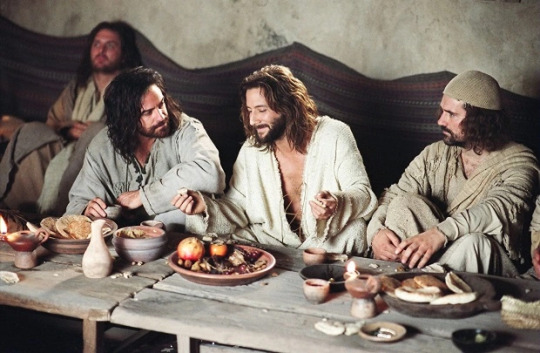
View On WordPress
#Barabbas#Ciaphas#Crucifixion#Garden of Gethsemane#Herod#Jesus Christ#Maundy Thursday#Paschal Pardon#Passion Week#Passover#Pontius Pilate
35 notes
·
View notes
Text

#good friday#christian quotes#crucifixion#cross of christ#jesus christ#sacrificial lamb#passion week#quotestoliveby#christian blog#jesus died for us#jesus died for our sins#redemption#sacrifice
3 notes
·
View notes
Text

Pray with me
3 notes
·
View notes
Text

2 notes
·
View notes
Text
Fearless Stewards
The thought of God’s approaching fills many people with fearful thoughts. But the way Jesus arrived in Jerusalem on Palm Sunday should demonstrate for us that instead of fear, we can be both fearless and rejoicing at His coming.
Listen to the podcast of this post by clicking on the player below, and you can also subscribe on Apple, Spotify, or Audible.
https://craigtowens.com/wp-content/uploads/2024/03/fearless-stewards.mp3
I’ve noticed over the years that some people get quite nervous—even fearful—with the thought of God coming close to then. Some people have told me, “I can’t go to church—the roof will fall in on…

View On WordPress
#2 Peter#Calvary Assembly of God#Gospel of John#Gospel of Luke#Gospel of Mark#Gospel of Matthew#Jesus Christ#no fear#Palm Sunday#Passion Week#prophecy#Psalm#Psalm 139#Romans#sermon#stewardship#Zechariah
3 notes
·
View notes
Text
Yeshua, she remembers his dark eyelashes and crescent moon smile and the way he touched her back when she splashed him in the river water, playing as children do, but they were too old to play those games anymore so she watches him hungrily in the synagogue from afar, and she alone sees him on the outskirts of the village arms outstretched to the heavens, lips moving silently, holy words only Adonai is privileged to hear.And she still remembers the day he left Nazareth, his brown feet precociously bare and his carpentry tools left behind, his mother Miriam laughingly fussing over him even as tears spilled down her pillowy cheeks. She would have followed him to the border of Eden if he asked but he never asked. And when she hears the rumors, the stories of leper’s spots dissolving off and evil spirits jumping into the cooking fire flames and fevers broken and priests reprimanded and windstorms banished and dead girls opening their eyes blooming with new life and second birth, she doesn’t scoff or question or gossip, she only wonders why again the dead girl awakened with the graze of a wrist wasn’t her. In the three years of his ministry she is wedded, and sets up her own household, and is welcomed into the circle of women weaving stories at the well, and a baby takes root in her womb only to end in a mess of blood, and she wonders, she wonders if he were still here if that would have been different along with everything else. And then another baby grows in her womb and this time she doesn’t bleed, but labors and bears a tiny babe, a boy named for his father, and she sobs on her pallet at night. And when her husband takes a fever and goes down to Sheol i, she wonders if she is one of those demoniacs damned by the Lord because she does not grieve, she plans. She leaves her swaddled infant on her sister’s doorstep. And she sandals her slim brown feet and sets off without a backward glance. He may have left her, but she will seek and find him with all of her heart. But his infamy has grown and she blends into the stunned crowds of followers, the many who speak starry eyed of him mending their broken hearts and forgiving their sins, and to them he is Christ, but she doesn’t know that lofty Messiah, the parable weaving rabbi, the miracle worker, the savior, she knows his quiet laugh and silent understanding. She traipses along with the rest of the rowdy crowd to Jerusalem for the Passover, and every day she clamors forward hoping for a moment to steal with him, to ask him, do you remember the wood comb you carved and slipped into my sleeve on my birthday, and touching my back in the warm river water, my skin electrified under the dampness of my robe, and your eyes darker and warmer than they had ever been before you left in such a hurry? But she never has a chance, there is always some apostle more important taking up his time, and she is no fool, she knows that his time is almost up. And so she stands on the sidelines with her palm leaf, crying out Hosanna as he rides on the colt of a donkey, and she imagines for a split second his eyes meet hers in the crowd . What will his fate be? Days later she will meet him on the way to the place of the skull, dripping blood and carrying the wood of his execution on his strong back. He falls, and she rushes forward like she was carried by the current on the sea and kneels, and unwraps her veil, and says in the voice of her own self as a small girl again, ‘let me.’ She wipes his face and he gazes at her with such intensity in his eyes she can hardly bear it, and whispers her name. For the first time in a long time she feels numb. But later on she will wonder, for the last time, if he looked at her in that tender liminal moment, and thought of the warm river water and the life that could have been with her, instead of the Bride he bled and hanged for. The swallows sang while he was on the cross, and the holiness was not lost on her. Just as the sanctity of those small moments in Nazareth were never lost for him.
#poetry#poet#my poetry#poets on tumblr#christian#catholic#st veronica#palm sunday#passion week#holy week#bible
2 notes
·
View notes
Text

Holy and Great Tuesday. Parable of the ten virgins. Modern Greek fresco. [OrthoChristian.com]
3 notes
·
View notes
Text
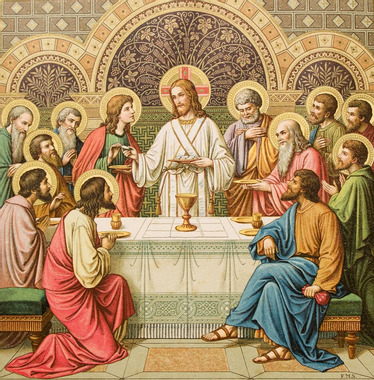
11 notes
·
View notes
Text
I really would rather watch it at my own pace at home, but streaming has been delayed so who knows how long until i get another chance to see it ¯\_(ツ)_/¯
plus the spoilers are getting harder to avoid...even the official social media is posting spoiler-y clips
#the chosen#the chosen season 4#the chosen tv series#the chosen tv show#jesus#christianity#the bible#dallas jenkins#Easter#holy week#passion week
14 notes
·
View notes
Text
Why were they all willing to die?
Why were they all willing to die?
As far as we know, only the Apostle John died a natural death. All the other Apostles of Jesus died for their faith. They were killed because of their fidelity to the message of Jesus. That fact begs the question: Why were they all willing to die?
Why the Disciples Were Willing to Die
Why were they all willing to die? I think this question can be answered in…
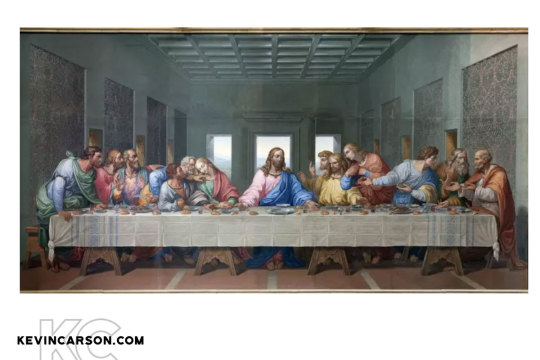
View On WordPress
2 notes
·
View notes
Text
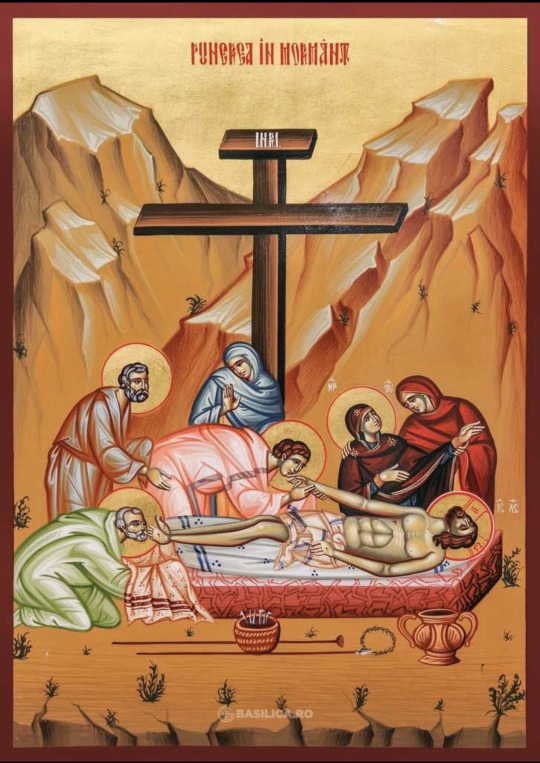
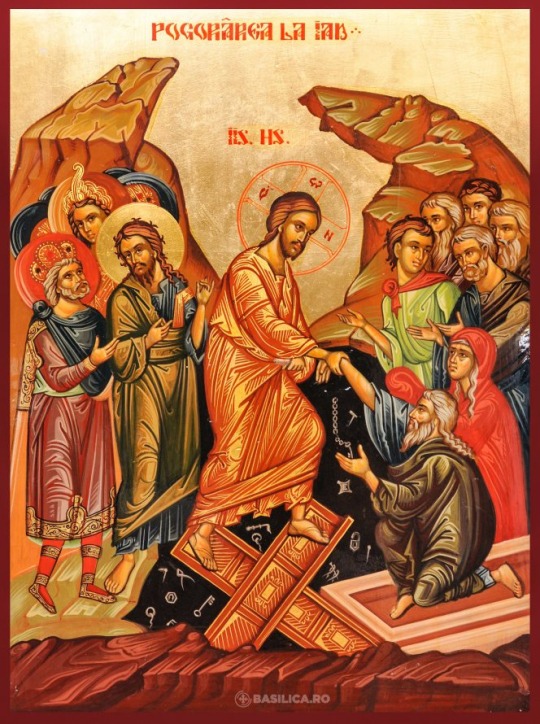
Great and Holy Saturday commemorates the burial of Christ and His descent into Hades.
Photo © Robert Nicolae / Basilica.ro
#romania#eastern orthodox#easter#holy week#passion week#holy saturday#churches of romania#orthodox icon#orthodox christianity#christianity#faith
27 notes
·
View notes
Text
Peter denies knowing Jesus
Then seizing him, they led him away and took him into the house of the high priest. Peter followed at a distance. And when some there had kindled a fire in the middle of the courtyard and had sat down together, Peter sat down with them.
A servant girl saw him seated there in the firelight. She looked closely at him and said, “This man was with him.”
But he denied it. “Woman, I don’t know him,” he said.
A little later someone else saw him and said, “You also are one of them.”
“Man, I am not!” Peter replied.
About an hour later another asserted, “Certainly this fellow was with him, for he is a Galilean.”
Peter replied, “Man, I don’t know what you’re talking about!”
Just as he was speaking, the rooster crowed. The Lord turned and looked straight at Peter. Then Peter remembered the word the Lord had spoken to him: “Before the rooster crows today, you will disown me three times.” And he went outside and wept bitterly.
- Luke 22:54-62 NIV (2011)
#bible verse#scripture#christianity#passion week#easter#peter the apostle#betrayal#lying#lies#crying#sadness#fire#cold#disciples#birds#prophecy#abandoned#luke 22#new international version
2 notes
·
View notes
Text
This Easter season in my reading through the Passion week there were several things I noticed that I thought might be worth sharing, mostly concerning suffering, having faith through it, and the joy to come after.
In John 13:31 through 17:26, Jesus is comforting the disciples. He has just told them that one of them will betray him (Judas has gone to do the deed), and told Peter that he will deny him three times, along with the fact that he is going to die. In the midst of tellling them about the Holy Spirit who will come to them, and of the Kingdom of Heaven, and of himself as the Overcomer in obedience to the Father’s will, he tells them this: “Truly, truly, I say to you, you will weep and lament, but the world will rejoice. You will be sorrowful, but your sorrow will turn into joy. When a woman is giving birth, she has sorrow because her hour has come, but when she has delivered the baby, she no longer remembers the anguish, for joy that a human being has been born into the world.” (John 16:20-21). This struck me, because Jesus says this on the night he was betrayed. Yes, he is telling them to take heart, and preparing them for the days to come, but it is also a picture of what he himself will go through, beginning that very night. Jesus himself was the sufferer, having sorrow because his time had come, only for all that torture and pain and suffering to culminate in new life, allowing each one of us a chance to be born again.
It can also be read literally. It comes directly after a passage in which Jesus tells them that the world will hate them, and then promises the Holy Spirit. In near one breath, he promises suffering, and then a comforter for that suffering, followed by the sorrow leading to joy. It brought to mind an image of the church as a woman in labour, and the Holy Spirit as the loving husband who grips her hand and kisses her brow as he tells her “just a little longer, darling,” while she works out the life he placed within her. It is the certain Word of God that his church, his people, will suffer on this earth, but it is also his word that he will bring it to joy at the end, and his word that he is beside us in it, and will not let us succumb to the pain.
Likewise, Israel was in pain as they waited the coming of the Messiah, persecuted by the nations around them, and crushed under the justice of God. But he had a promise to keep, a promise to bring to fruition. In Isaiah 42, moments after a passage about the coming Messiah, He says: “For a long time I have held my peace; I have kept still and restrained myself; now I will cry out like a woman in labour, I will gasp and pant.” (Isaiah 42:14). He is speaking of taking action to return the exiles home, and also of his new work, his new song, as he remembers his promise of the Messiah, which is fulfilled in Jesus.
So there they are: story, within story, within story. The suffering of Israel and a world steeped in sin before redemption, and the suffering of the church, redeemed but still living in a broken world, both as microcosms of the suffering of Christ, innocent and undeserving, yet willing to take it upon himself for the sake of the life to be born of it. In all of them is the same pattern, the same promise. There will be sorrow. But at the end there will be joy. In the time where the Father spoke through the law and the prophets, the joy was the birth of the Son, the Messiah; in the time of the Son the joy was the birth of the church, made possible by his death and resurrection, and now in the church age, in the time of the Holy Spirit, the joy shall be the future return of our Lord to Earth. Then there shall be the New Heaven and a New Earth, and there shall be no more sorrow or pain, but only joy as we see God face to face, triune, but completely one, and in that age he shall sit on his throne and all shall know him as King of Kings and Lord of Lords.
Sorrow. Then joy. So often it is easy to get lost in the sorrows and sufferings we have here, so easy to speak only of the crucifixion and forget the resurrection, at least I know that is my own tendency. But as I read, I discovered that there was a man who, in the midst of great suffering, had his eyes on the future joy, and it is not the one any would have expected. One thief, crucified on the cross beside Jesus, had faith in this pattern that God had set out. In Luke 23, an account is given of one of the criminals who hung beside Jesus on the cross and said to him, “Jesus, remember me when you come into your kingdom.” (Luke 23:42) He was dying a criminal’s death, suffering greatly, and to his eyes Jesus was doomed to the same end. Scourged to beyond recognition, hanging like a criminal himself, and the thief beside him still believed he had enough power that it would be worth asking to be remembered. He asked a man who was dying to remember him. If that’s not faith in resurrection, or at the very least the immortality of the human soul, I don’t know what is.
And I ask myself if I have that same faith. If I can look at my suffering where all seems lost and say, “no, God has promised joy, and so there will be.” It was there at the birth of the Messiah, there at the Resurrection of our Lord, and there will be when he returns. Again and again his promises have been fulfilled, yet still as Peter, still as Thomas, I am sometimes too afraid to put faith in them, too distracted by the horror of what is before me. So that is my prayer this Easter, for myself, and for anyone else who needs it, that we would see the Joy. That we would remember God does not desire suffering, but brings us through suffering to something that is greater and more beautiful than we could ever imagine.
Happy Easter, and may the joy of the Living God go with you!
#Easter#bible#passion week#God is so good#It's amazing to me that in all of this#He is also the one who created the very metaphor he used here#and allowed us to be a part of it#As a woman there is something so tender and personal about God's plan being compared to childbirth#And also it makes his punishment for Eve make so much sense#He knew the world would suffer in sin#but knew he could bring life out of that suffering#so he gave us the perfect way to understand that#and while it was painful for Eve#it also allowed her to be so involved#I'm repeating myself at this point#but I could gush about this all day I swear
1 note
·
View note